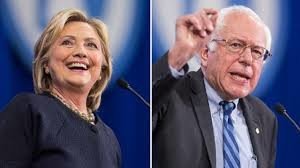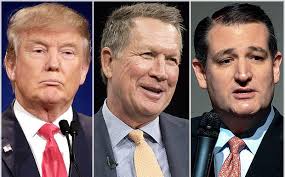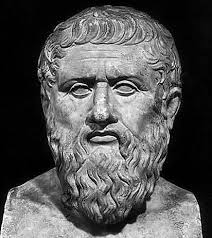Insiders, Outsiders
The main explanation – or “narrative,” to cite the current cliché – of the U.S. presidential election nomination race of 2016 is that it’s a contest between political “insiders” (representing “the Establishment”) versus “outsiders” (representing “the People” — and the people, by the way, are “angry”). Once you’ve got that simplistic meme nailed down, you understand everything.
“Insiders” are bad and deceptive; “outsiders” are good, often heroic, and they “tell it like it is.” What’s more, they are not part of the Washington crowd and, as everybody knows, “Washington-is-broken” (i.e., government doesn’t work, is corrupt, gridlocked, and wants to take away your God-given-right to guns), which is why “the people” are “angry.” If all that’s perfectly clear, all you’ve got to do now is take out your inside baseball (or inside politics) program and match the players to their positions.

Hillary Clinton, Bernie Sanders.
On the Democratic side, Senator Bernie Sanders (D-Vermont) is the outsider, bucking the establishment and standing up for the people. He is often heard “speaking Truth to Power.” Former Secretary of State Hillary Clinton (she’s also former senator, D-New York, and former First Lady, spouse of former president Bill Clinton) is the insider, representing the Democratic National Committee establishment and various other establishments. As if that’s not bad enough, she is also, according to her political opponents, a liar, a war-monger and/or war criminal, a Republican, a Wall St. toady, the Whore of Babylon, and perhaps worst of all, an “enabler” of her husband’s former sexual depravities. Any minute now, she will be indicted for something – the possibilities range from treason to bad clerical filing – as a result of an FBI investigation into her shenanigans. And those are merely the claims of her Democratic opponents (a.k.a., “Bernie or Bust,” “Bernie Bros.,” etc.).

Donald Trump, John Kasich, Ted Cruz.
On the Republican side, Donald Trump, a.k.a. The Donald, a billionaire businessman and former reality TV star is the consummate outsider who will “Make America Great Again.” The angry people like him because he’s the one “who tells it like it is.” He promises to build a wall between the U.S. and Mexico, and to expel some 12 million Mexican migrant workers, many of whom, he says, are rapists and drug dealers. He proposes to ban all Muslims from the U.S. and boasts that he will destroy the Islamic State in a terrific conflagration. He’s not averse to denouncing women, making fun of the disabled, taking on the media, and personally insulting any and all of his political opponents.
Also running are Senator Ted Cruz (R-Texas) and Governor John Kasich (R-Ohio). Senator Cruz represents himself as an outsider, even though he holds elective office in the U.S. Congress, because he’s a sort of “maverick,” “rogue,” “true conservative,” or “extreme right-wing ideologue.” By contrast to the other two, Governor Kasich is perceived as a “moderate,” and presumably an insider representative of the (Republican) establishment, given that he’s served about a quarter-century in government, as a two-term governor and previously a member of the House of Representatives for almost 20 years.
Once you’ve got all these definitions sorted out, it’s up to you. There’s only one small problem with this account: it’s all bullshit.
Well, 98 per cent bullshit. It’s a “narrative” riddled with half-truths, nutty ideology, and outright falsehoods.

Plato.
Start with the whole idea that what we should want for government are outsiders who have never been tainted by having held elected office. These outsiders should be strongly and loudly opinionated (like your cranky uncle at Thanksgiving dinner) but not necessarily knowledgeable about anything pertaining to society and government, from foreign policy to domestic views about immigration, education and/or environmental programs, and finally, they should be as vulgar and trigger-happy as possible. It’s a nutty model of political leadership and those who’ve pointed out it’s a nutty idea go all the way back to Plato’s Republic, and sundry other Socratic dialogues.
At the heart of this is the question of whether politics is a matter of knowledge, art, and understanding and whether it requires a form of education. If your bathroom pipes are clogged, do you want a competent plumber to fix them or an “outsider”? The same is true of teachers, horse-trainers, dentists and the like. It’s fashionable to think that just anybody can walk in off the street and manage multi-trillion dollar budgets, command armies, and craft legislation. The more innocent they are of knowledge, the less chance that they’ll be corrupt goes this shibboleth of unreason.
Underlying a good deal of this enthusiasm for outsiders is the myth that American government and/or American society doesn’t work. This is also a kind of nonsense. Of course, we don’t want to ignore the failings of an over-powerful empire based on capitalist enterprise that is deeply marred by racism, principally against African-Americans (but many others as well). I.e., “Black Lives do Matter,” and ditto for all the other justifiably criticizable U.S. policies, actions, and history.
At the same time, the Washington-is-broken mantra is false and primarily serves to further support a form of anarcho-“cowboy capitalism” and the erosion of citizenship, or its reduction to mere “outrage.” If you take a step back, and view the U.S. from a world perspective, government works pretty well there (at least until “Tea Party,” religious fundamentalists and even further right-wing Republicans took control of Congress, thanks to the electoral indifference of “the people”). American society is relatively orderly (apart from untrammelled gun violence), the roads more or less work, even the capitalist economy functions better than the economies of most other places, and the mail (consisting largely of Amazon.com online shopping packages) is delivered. If you want to see guv not working, try Somalia, Iraq, Russia, Libya (and about 50 other countries). The anti-government hyperbole of the about 25 per cent of the populace representing the True Right and the 5 per cent of the populace representing the True Left gets way more airtime than it deserves. Did we mention that most of the bleating about the Mainstream media is misconceived and the praise of the often fact free Minorstream media wildly exaggerated? Wait, that’s another whole topic… don’t get us started.
Frankly, we prefer informed minds (insiders like Bernie Sanders, Hillary Clinton, John Kasich – whether we fully or partially agree with them, or strongly disagree) to ignorant outsiders (like Trump and Cruz). It’s easy to diss the politicians and to pretend that there’s nothing to governing except “telling it like it is.” And of course Trump and his ilk don’t tell it like it is, rather, they tell an often ignorant segment of the people what they think they want to hear, and encourage them to vent their misplaced anger. On the far left, there’s an equally fraudulent romanticism about “the people” that often conceals forms of totalitarianism, opposition to free speech, and disturbingly disturbed personalities.

Sanders, Clinton.
When it comes to the realities of the candidates: Sanders is a seasoned left-of-centre, largely independent politician who has spent a worthy career primarily in the role of the loyal opposition. Hillary Clinton is a centrist Democrat with mostly progressive policy positions and a record of level-headed public service, despite occasionally mistaken judgments, many of which she’s apologized for and altered. Kasich is an experienced politician who offers an option for those who take more conservative, but not extreme, positions on the economy and culture. All three are qualified to serve in the office they’re seeking. The others have so far provided no evidence they are fit to be president, commander-in-chief, or dog-catcher.
At the bottom of many of the critical problems that the presidential nominating process has exposed is the failure of education in a democracy, but that’s a whole other topic… i.e., don’t get us started on that. As the Austrian satirist Karl Kraus once summed it up, “The situation is hopeless, but not serious.”
